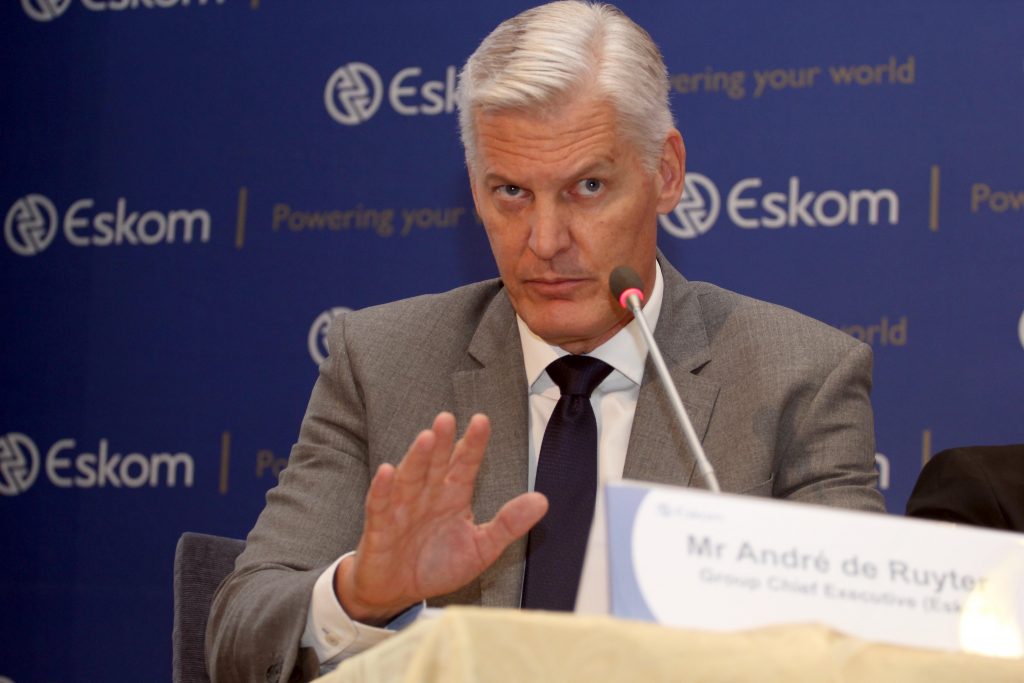I'm not resigning, says Eskom boss

Eskom CEO André de Ruyter is going nowhere. The board has not discussed his resignation with him and he will not hand it in of his own accord.
Facing sharp questions about the current round of Stage 4 load shedding from up to 500 journalists at a hastily convened media briefing on Tuesday afternoon, a tired-looking De Ruyter said Eskom needs continuity in leadership and he is staying put.
De Ruyter’s response comes after calls for his resignation – from among others the Black Business Council (BBC) and the National Union of Metalworkers (Numsa) – in light of Eskom’s continued inability to provide stable power supply to the country.
In recent days Eskom has blamed a shortage of diesel, negligent staff, maintenance delays, procurement delays, lack of money and a power blackout in Zambia for the blackouts South Africa has been suffering on and off since October.
On Tuesday the utility added to the list municipalities and large power users that do not comply with the load shedding instructions, which De Ruyter said led to Eskom intensifying load shedding from Stage 2 to Stage 4 this week.
Group executive for generation Segomoco Scheepers refused to name the errant clients and municipalities, saying the list of municipalities “is quite long” since only Buffalo City and eThekwini did comply.
Scheepers said Eskom has written to these non-compliant councils.
When pressed on details he confessed that “not all of the 160” odd municipalities were non-compliant. “We looked at the bigger municipalities.”
He did not answer a question about the extent of the shortfall in volume shed in response to the Stage 2 instructions.
Eskom chief operating officer Jan Oberholzer said Eskom can currently only reliably provide 25 000 to 27 000 megawatts (MW) of generation capacity.
On Monday (November 8) the total demand was 30 440MW, according to data tweeted by Eskom spokesperson Sikonathi Mantshantsha.
Evening Peak Feedback 08/11/2021, 18:45
Total demand: 30 440MW
Loadshedding: 4 296MW
Interruptible Load Supply: 0
Virtual Power Station: 317MW
OCGT’s Utilised: 0
Renewable Gen: 1 628MW (Wind 1 240MW, CSP 388MW)@Eskom_SA Available Generation Capacity: 28 523MW@EskomSpokesper1
— SikonathiMantshantsh (@SikonathiM) November 8, 2021
De Ruyter said repeatedly that the country needs 4 000 to 6 000MW of additional generation capacity to ensure electricity security.
He welcomed the recent announcement of the winning bidders in the Department of Mineral Resources and Energy’s fifth round of renewable energy procurement from independent power producers.
These projects still have to reach financial close, and it will take around two years thereafter before they come to the aid of the struggling Eskom.
Eskom’s hopes for the rest of this week
De Ruyter said Eskom hopes to return an increasing number of generating units to service and expects to reduce the level of load shedding to Stage 3 on Wednesday morning at 5:00 and further to Stage 2 on Friday morning at the same time. It hopes to stop load shedding at 5:00 on Saturday morning.
De Ruyter and Oberholzer both gave the assurance that the Eskom power system is not close to total collapse.
Oberholzer said the Eskom system operator is among the best in the world at managing a constrained system.
He also called on energy analysts to refrain from making irresponsible statements about the likelihood of a total blackout.
De Ruyter, when asked why his expectation shortly after assuming the top job at Eskom that power supply would stabilise within 18 months was not fulfilled, pointed to three issues.
He said firstly Eskom lost six months in its maintenance programme due to the impact of Covid-19. Secondly, the pressure on Eskom’s liquidity further restricted the ability of the finance team to release funds for maintenance. And in third instance, he did not fully appreciate the challenges posed by government’s procurement rules.
“It takes 77 days to get National Treasury approval” for certain procurement decisions, said De Ruyter
He added that Eskom cannot within these restrictive rules appoint competent contractors swiftly, efficiently and properly resourced with spares and everything they need to do the job.

